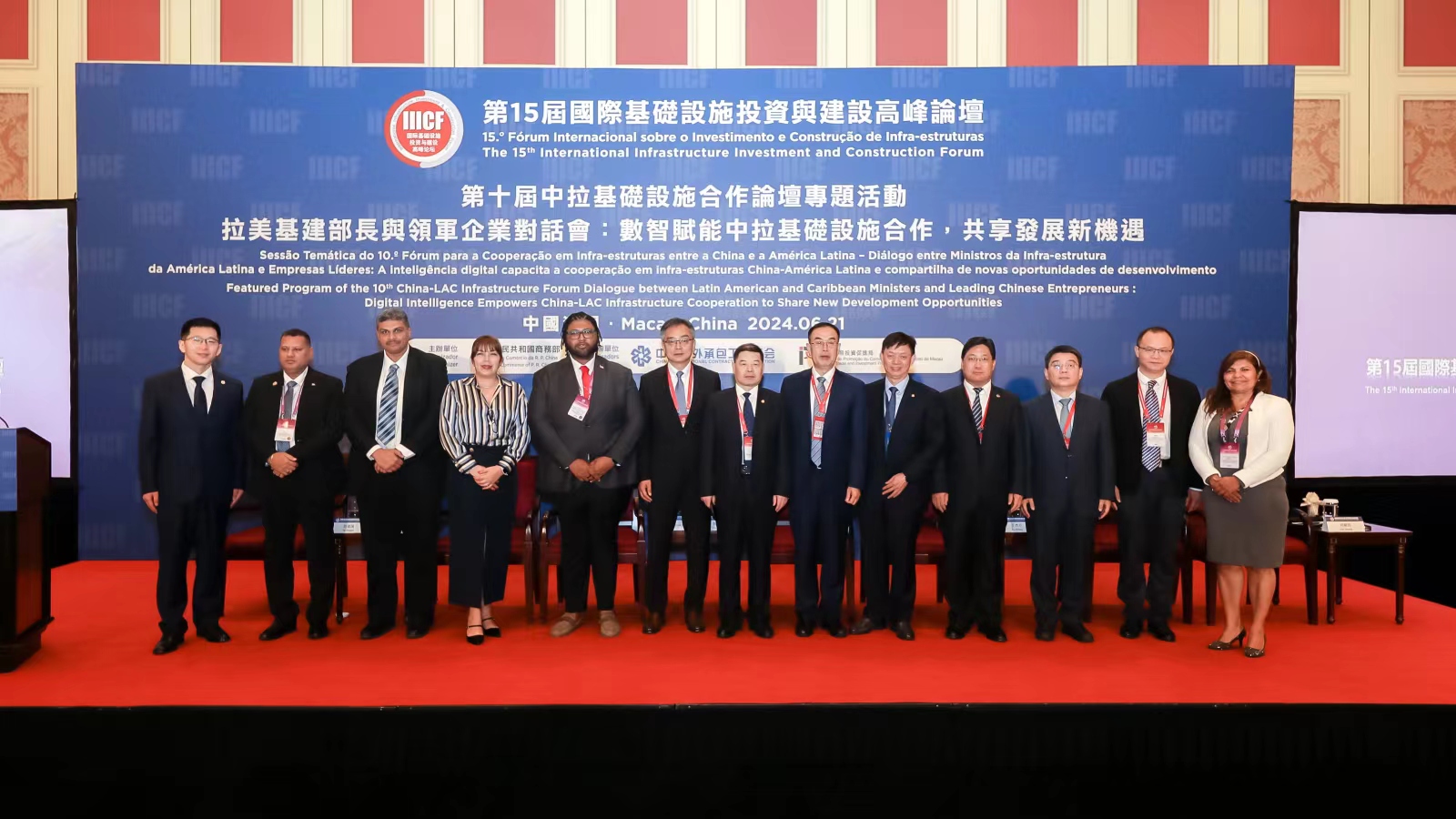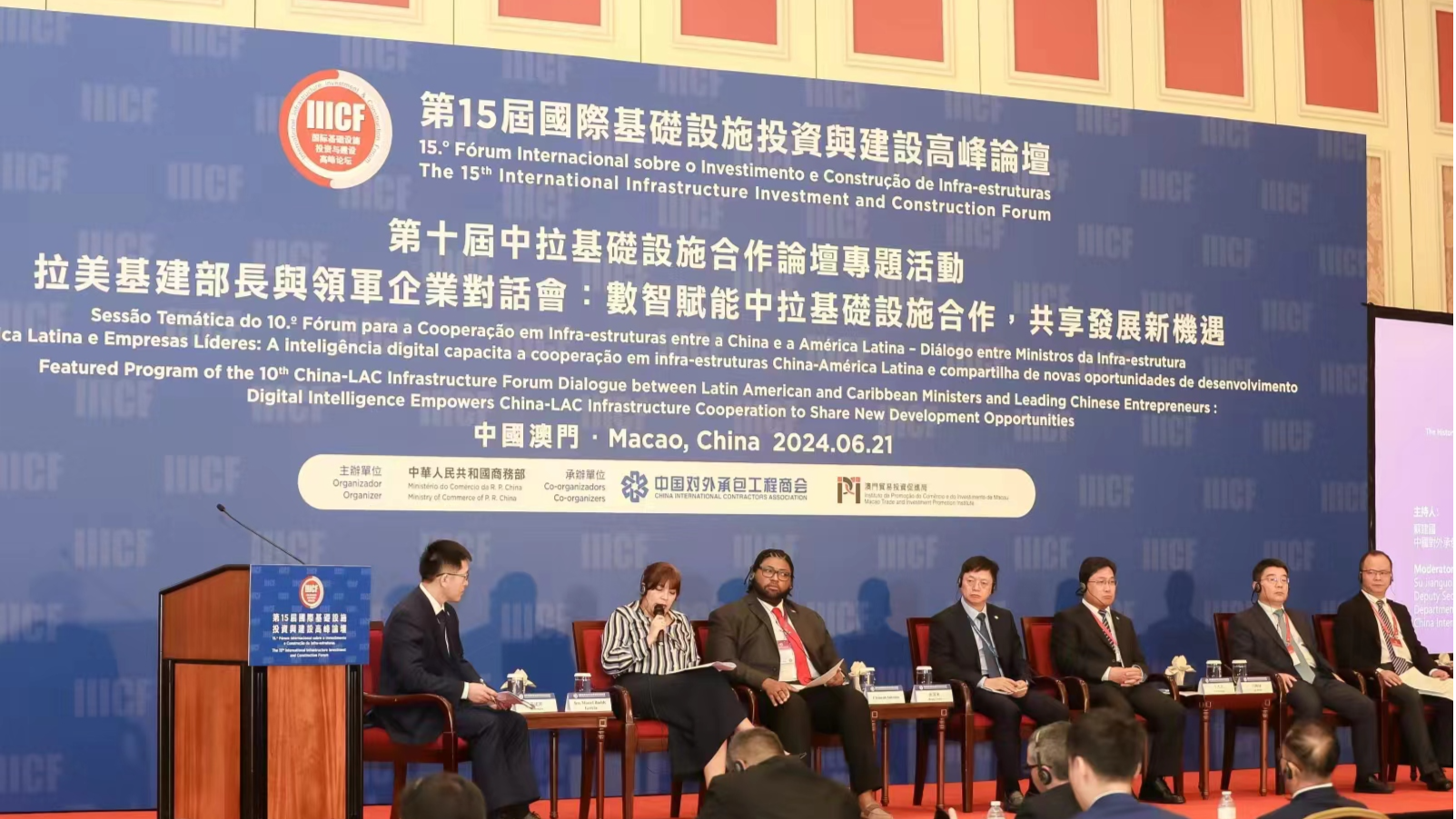
For Latin American and Caribbean (LAC) countries, China's advanced technology and financial support offer a beacon of hope by giving them access to necessary resources to build resilient and digital infrastructure, a forum in Macao heard on June 21.
The comments came on the second and final day of the 10th China-LAC Infrastructure Forum, held as part of the 15th International Infrastructure Investment and Construction Forum in Macao, which ran from June 19-21.
Permanent Secretary of Suriname’s Ministry of Public Works Satish Mohan outlined the country’s progress and talked about the challenges and opportunities in its infrastructure development
On the 10th anniversary of the forum, the event focused on low-carbon and intelligent infrastructure transformation between China and LAC countries.
READ MORE: Joint infrastructure building contributes to LAC economies
China has steadily promoted economic and trade cooperation with Latin American and Caribbean countries in various fields in recent years, said Su Jianguo, the moderator of the forum’s second day. Su is the deputy secretary-general and director-general of the China International Contractors Association’s Department of Projects and Investment.
According to Su, the China-CELAC Joint Action Plan for Cooperation in Key Areas (2022-24) focuses on constructing high-quality infrastructure in China and LAC countries, alongside integrating green, low-carbon, and digital transformation into traditional infrastructure cooperation between China and LAC countries.
The forum also saw a dialogue between Latin American and Caribbean ministers and leading Chinese entrepreneurs.
Colombia’s Minister of Transportation William Camargo Triana said that Chinese investment in infrastructure in Colombia is worth $5.7 billion in total including $925 million in 2023.
Triana said many infrastructure projects in Colombia have been funded and constructed by Chinese companies, which symbolizes the deeply-rooted cooperation and friendship between China and Colombia with complementary advantages for each other.
Venezuela’s Vice-Minister of the People's Power for Electrical Energy Tania Elizabeth Masea Linares introduced the country’s national renewable energy development plan from 2022 to 2030 and 12 specific project plans.
These covered wind power, solar energy, photovoltaic, biopower, and other power projects, giving the Chinese enterprises at the forum a clear understanding of the potential areas to work with the country.

Permanent Secretary of Suriname’s Ministry of Public Works Satish Mohan outlined the country’s progress and talked about the challenges and opportunities in its infrastructure development.
He said these include improving their road network and traffic safety, improving drainage and sewerage infrastructure, and preventing flooding in urban areas, coastal flooding, and erosion in populated areas.
The second day of the forum featured talks about the history and practice of China-LAC infrastructure cooperation, as well as the opportunities and challenges ahead.
China and Honduras established diplomatic relations last March and cooperation between the two countries on infrastructure has continued to promote the betterment of bilateral relations.
Parliamentary Secretary in Antigua & Barbuda’s Ministry of Housing, Public Works, Lands, and Urban Renewal Clement Antonio said that Caribbean countries consider China as more than a partner – it has been a vital ally
Secretary-general of Honduras’ Ministry of Infrastructure and Transport Iris Mariel Budde Garcia said that infrastructure and power generation facilities are crucial to the country’s economic and social development.
She noted that China enjoys rich construction experience in this area and Honduras hopes to have close cooperation with China in this aspect.
READ MORE: Global infrastructure investment forum kicks off in Macao
Parliamentary Secretary in Antigua & Barbuda’s Ministry of Housing, Public Works, Lands, and Urban Renewal Clement Antonio said that Caribbean countries consider China as more than a partner – it has been a vital ally.
Chinese investments have fueled the modernization of ports, highways, and energy infrastructures, crucially supporting their tourism-dependent economies, and “for Antigua and Barbuda, these developments are lifelines, enhancing connectivity and economic resilience”, Antonio said.
“Our partnership with China in infrastructure development represents a golden opportunity. It is a powerful collaboration that can propel us into a future of resilience and prosperity,” he noted. “By embracing this cooperation, we can transform our vulnerabilities into strengths, addressing our climate crisis with robust and sustainable infrastructure.”
Contact the writer at vivienxu@chinadailyapac.com


